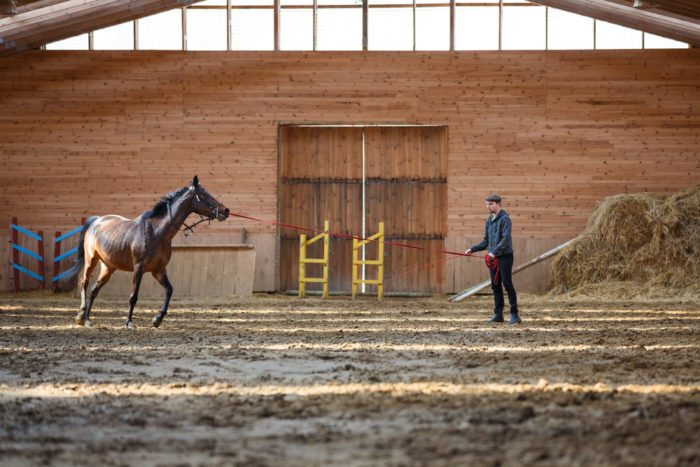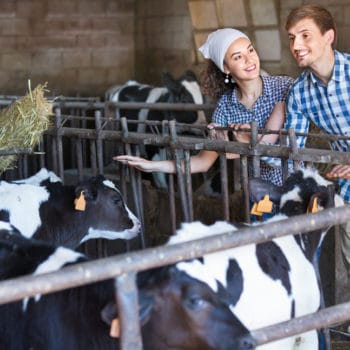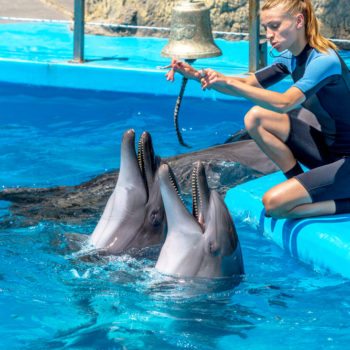Why We Love It
-
$33,600Potential Avg. Salary
-
11.1%Job Growth Rate
-
Growing DemandJob Outlook
-
High Job SatisfactionCareer Attribute
Horse trainers use a variety of techniques to encourage horses to adopt the behaviors needed for successful trail walking or competition in equestrian sports. They train horses to wear saddles, to allow for riders, to race, and to compete in sports like dressage, cutting, and show jumping.
Recommended Schools
What is a Horse Trainer?
The following job responsibilities are common for individuals in horse trainer roles:
- Evaluate horse personalities to develop training plans and identify promising horses
- Train horses to be calm around humans and riders, wear saddles, and avoid behaviors like rearing, kicking, and biting
- Teach horses to respond to commands in order to succeed in equestrian sports like racing, dressage, cutting, and jumping
- Ensure horses are getting the proper exercise, nutrition, and care
- Teach jockeys and other riders how to ride trained horses properly and execute commands
A Day in the Life
Horse trainers are experienced riders who use their thorough knowledge of horses and personalities to teach horses how to respond to human commands. They may train horses to be amenable to general riding, or they may train horses to compete in equestrian sports like racing, dressage, cutting, and show jumping. Horse trainers may travel to train different horses at the farms of the horse owner, or they may work at a stable or training facility where they work to train multiple horses from different owners.
When receiving a new horse, the trainer must first evaluate the disposition of the horse. Horses are notoriously skittish and often require significant immersion training before they’re comfortable enough around people to accept riders. Horse trainers begin training by teaching the horse to wear a saddle and training it to avoid engaging in dangerous behaviors like kicking, head-jerking, biting, and rearing. When evaluating horses, trainers will determine what activities a horse might be good at performing.
Horse trainers may specialize in teaching horses to engage in a variety of activities. Some horse trainers work for stables that offer horseback riding lessons and train horses to accept riders and trail-walk. Some train potential racing horses to compete in major events like the Kentucky Derby, the Preakness Stakes, or the Belmont Stakes. Others train horses to compete in major equestrian sports like dressage, eventing, vaulting, polo, reining, show jumping, or cutting.
Typical Work Schedule
The work schedule for horse trainers can vary wildly from trainer to trainer. Most horse trainers work full-time schedules, but overtime can be common, especially before major competitions. Horse trainers who work at stables that offer riding lessons commonly work on weekends to accommodate student’s school or work schedules. Self-employed trainers who take on individual clients may work for long periods and then have breaks between clients where they don’t work at all.
Typical Employers
Horse trainers may work for a variety of employers. Some are self-employed and take on individual clients. Some own their own farms and offer multiple services such as stabling, training, and riding lessons. Many are employed by other trainers or farm/stable owners.
Recommended Schools
How To Become a Horse Trainer
The most important credential to have when aspiring to become a horse trainer is experience working with and riding horses. Aspiring horse trainers should spend a lot of time taking horseback riding lessons and, ideally, competing in equestrian sport competitions. Starting your career in lower-level positions at farms and stables can be a great catalyst for a career as a horse trainer because you’ll gain valuable experience in caring for and riding horses, and may even be able to work under an experienced trainer.
Another common way to start a career as a horse trainer is to pursue a relevant college certificate or degree. Some colleges offer 2- or 4-year programs in equine science or equine management that educate students in caring for and training horses. If you’re unable to find a degree program in your area focused on equine studies, finding a college that has an intercollegiate team could also provide relevant experience, and can be combined with a degree in animal sciences or ranch management.
In addition to a degree and experience working with horses at a stable or farm, some aspiring horse trainers find that they can be more competitive for open positions by pursing sport- or breed-specific certifications. For example, the United States Hunter Jumper Association offers a certification for trainers specializing in training horses to perform in hunting and jumping events. The Certified Horsemanship Association offers a variety of certifications for general and specific training focuses.
Horse Trainer Salary Data
We’ve provided you the following to learn more about this career. The salary and growth data on this page comes from recently published Bureau of Labor Statistics data while the recommendations and editorial content are based on our research.
National Anual Salary
Low Range
$20,640Average
$33,600High Range
$57,170National Hourly Wage
Low Range
$10/hrAverage
$16/hrHigh Range
$27/hrHow do Horse Trainer salaries stack up to other jobs across the country? Based on the latest jobs data nationwide, Horse Trainer's can make an average annual salary of $33,600, or $16 per hour. This makes it an Above Average Salary. On the lower end, they can make $20,640 or $10 per hour, perhaps when just starting out or based on the state you live in.
Salary Rankings And Facts
#644 Nationally for All Careers
Programs and Degrees
Here are the most common degrees for becoming a Horse Trainer. a is usually recommended and specifically a degree or coursework that prepares you for the particular field, see below.
Highest Education Among Horse Trainers
- 1.1% Doctorate
- 3.3% Masters
- 26% Bachelors
- 8.1% Associates
- 27.3% College
- 28% High School
- 6.1% Less than High School
Job Growth Projections and Forecast
2014 Total Jobs
36,8002024 Est. Jobs
40,900Job Growth Rate
11.1%Est. New Jobs
4,100How does Horse Trainer job growth stack up to other jobs across the country? By 2024, there will be a change of 4,100 jobs for a total of 40,900 people employed in the career nationwide. This is a 11.1% change in growth over the next ten years, giving the career a growth rate nationwide of Below Average.
Growth Rankings And Facts
#159 Nationally for All Careers
What Companies Employ The Most Horse Trainers
| Industry | Current Jobs | New Jobs Needed | % Increase |
|---|---|---|---|
| Self-employed workers | 15,900 | 2,400 | 3% |
| Animal production and aquaculture | 6,200 | 500 | 1% |
| Support activities for agriculture and forestry | 4,900 | 600 | 1% |



















